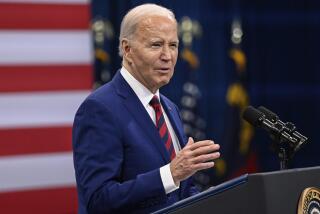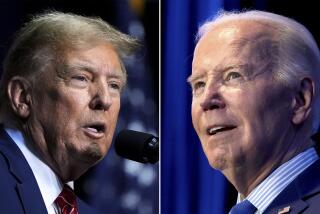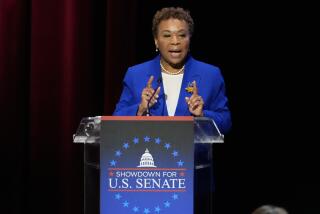Obama easily wins heated S.C. primary
Veteran political writers Don Frederick and Andrew Malcolm offer irreverent takes on the 2008 campaign.
•
Barack Obama romped to victory Saturday in the South Carolina Democratic primary, a landslide powered by African American voters energized by a chance to elect the nation’s first black president.
The win, the most lopsided of the campaign, gives the Illinois senator a big lift heading into the coast-to-coast balloting Feb. 5. He once more demonstrated strong support among young and change-minded voters, who helped set another record turnout.
“The choice in this election is not between regions or religions or genders,” Obama told a boisterous crowd in Columbia that repeatedly interrupted his remarks with cheers. “It’s not about rich versus poor, young versus old, and it is not about black versus white. This election is about the past versus the future.”
The outcome of the Democratic contest, after a week of racially charged campaigning, also suggested divisions that flew in the face of Obama’s message of unity. The Illinois senator won 4 out of 5 black votes in the state Saturday versus 1 out of 4 white votes, according to exit polls.
Hillary Rodham Clinton and John Edwards, who split most of the white vote, finished second and third, respectively. Clinton and Edwards ran even among white women; Edwards, a former North Carolina senator and a South Carolina native, carried a plurality of white men.
Obama made significant inroads with one group of white voters: He carried half those younger than 30.
He also fared well on issues. Half of voters cited the economy as the major problem facing the country; Obama was that bloc’s clear favorite. He enjoyed an even bigger edge among voters naming healthcare or the war in Iraq as the country’s biggest problem.
Clinton left the state about the time the polls closed at 7 p.m., but called Obama from her plane to congratulate him before taking off. Nearly final returns showed Obama with 55% of the vote, Clinton with 27% and Edwards with 18%.
Appearing hours later in Nashville, Clinton thanked South Carolina residents, then talked about the landslide of votes coming Feb. 5, when voters in more than 20 states -- including California -- will go to the polls.
“I want to tell you how excited I am that the eyes of the country turn to Tennessee and the other states that vote on Feb. 5,” the New York senator told a crowd of several hundred at Tennessee State University. “Millions and millions of Americans will have the chance to have their voices heard and their votes counted.”
Edwards, who carried South Carolina in his 2004 bid, vowed Saturday night to stay in the race “to give voice to millions of Americans who have absolutely no voice in this democracy.” He planned to campaign today in several states with Feb. 5 contests.
For months, Clinton was the leader in South Carolina polls, but that began to change as Obama’s campaign gathered strength. His support among black voters exploded after his Jan. 3 victory in the Iowa Democratic caucuses, and his win Saturday was bigger than many analysts had expected.
Speaking at a victory rally at the Columbia Metropolitan Convention Center, Obama declared: “After four great contests in every corner of this country, we have the most votes, we have the most delegates and the most diverse coalition of Americans that we’ve seen in a long, long time.”
Sounding themes similar to the speech delivered after his Iowa triumph, Obama decried a politics that foments division. “I did not travel around this state over the last year and see a white South Carolina or a black South Carolina,” he said. “I saw South Carolina.”
Giddy, the crowd chanted, “Yes, we can!” and “Race doesn’t matter!”
But at the same time, Obama took veiled swipes at Clinton and her husband, the former president, over the acrimony of the last week, saying, “We are up against the idea that it is acceptable to say anything and do anything to win an election.”
South Carolina, which was given the privilege of an early-voting slot to promote diversity in the Democratic race, was the first contested state with a large black population. Exit polls indicated that more than half of those who turned out Saturday were African American, up slightly from four years ago, and many had an eye on history.
About noon Saturday, 17 consecutive African Americans leaving a polling place in working-class Orangeburg said they had voted for Obama.
“It tells me that people and times are changing,” said Sarah Favors, who has taught for 25 years at historically black South Carolina State University. “And to see it happening here in South Carolina tells me that things are really changing, because people here like things to stay the same.”
There were 45 pledged national delegates at stake in Saturday’s voting, with Obama projected to win the most. But more significant was the momentum that comes with victory, which has gone back and forth between Obama and Clinton on virtually a weekly basis since his strong opening win in Iowa’s caucuses.
The two can now claim a pair of victories.
“This was a big win for Obama,” said John Anzalone, a Democratic pollster who is not affiliated with a campaign. “It shows this is going to be competitive all the way to the end.”
It could be ugly, too. South Carolina, a state with a history of incendiary elections, is where an already nasty contest turned raw and racial.
Obama and Clinton clashed in the harshest debate of the campaign: He derided her service “as a corporate lawyer sitting on the board of Wal-Mart,” she accused him of doing the legal bidding of a Chicago slumlord. Their venom carried over to the airwaves.
The Clinton campaign broadcast a radio spot suggesting Obama was at heart a Reagan Republican. Obama responded with an assertion that Clinton would “say anything to get elected.”
Clinton left the state for two days midweek and placed her campaign in the formidable hands of her husband, who won South Carolina in his 1992 White House run. Critics accused the former president of injecting race into the contest through a series of veiled remarks; he angrily denied the assertion, and campaign strategists said they were pleased with his prominent role.
But interviews with voters leaving their polling places Saturday suggested a backlash. About 6 in 10 said the former president’s campaigning was important in shaping their decision; of those, nearly half went for Obama, according to the survey conducted for television networks and the Associated Press.
Moreover, Obama handily defeated Clinton among those who made their minds up in the final three days of the campaign, when coverage of the former president dominated the news.
“It was a choice between old and new, and people wanted new,” said Dick Harpootlian, an Obama supporter and former state Democratic Party chairman.
But aides to candidate Clinton said Saturday that the former president would continue to campaign on his wife’s behalf as the race shifts to what is in effect a national presidential primary.
Up to now, the nominating fight has been a series of single-state battles in discrete regions: Iowa in the Midwest, New Hampshire in the Northeast, Nevada in the West and South Carolina below the Mason-Dixon line.
Florida Democrats vote Tuesday, but that contest has been diminished by a candidate boycott stemming from its violation of party rules forbidding such an early vote. The focus from here out is Feb. 5, when more than 20 states hold nominating contests. At stake will be nearly 1,700 national convention delegates, well over half the number needed to secure the nomination.
Despite cloudy, chilly weather, South Carolina Democrats posted a record turnout Saturday -- more than 532,000 voters -- continuing a pattern in this election season.
Unlike the race in Iowa, a mostly positive contest that buoyed many Democrats, South Carolina left a sour tang.
“A tough competition is good,” said Jenny Backus, a Democratic consultant watching from the sidelines. “But we have to come together in the general election. There are three qualified candidates. We would be better off debating their different leadership styles than ripping each other’s faces off.”
Times staff writers Maria L. LaGanga in Columbia, S.C., James Rainey in Orangeburg, S.C., and Peter Nicholas in Nashville contributed to this report.
More to Read
Start your day right
Sign up for Essential California for news, features and recommendations from the L.A. Times and beyond in your inbox six days a week.
You may occasionally receive promotional content from the Los Angeles Times.







